FREE Standard Shipping On All Orders $100 or More!*
4 Earth Friendly Alternative Pool Water Treatments
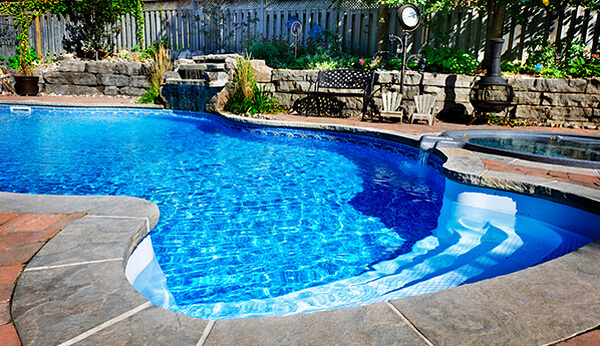
Pool owners know what a chore it is to maintain a clean and balanced swimming pool. And, a lot of the harsh chlorine and chemical-based cleaners and products we use to maintain our pools can be harmful to our health and the environment.
What's more; chlorine-based pool products may not be completely effective against germs and bacteria, according to the U.S. Centers for Disease Control and Prevention.
There are other, greener ways to keep your pool clean - read on:
Natural Pool Purifiers
Here's 3 ways to dramatically reduce the amount of chlorine needed to keep your pool sanitary and free of algae. Ultraviolet light systems bombard the water with UV light, used for thousands of years for sanitation purposes. None of these are touted as "stand alone" systems, but allow you to reduce your chlorine consumption by 50% or more.
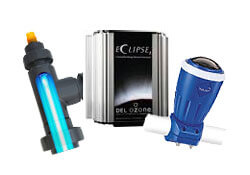
Another ancient water treatment is Minerals; copper and silver, which have natural bacteriostatic properties. Modern science has harnessed the O³ molecule. Ozone is a gas that is injected into the plumbing line, where it kills anything it comes in contact with.
Switch to Salt or Go Natural
Saltwater pools are self-sanitizing and naturally break down bacteria and germs. By the use of electrolysis, the salt turns into chlorine, and can be regenerated again and again. Saltwater Systems produce fewer disinfectant byproducts and side effects (including irritated skin, itchy eyes, lung problems and asthma-like symptoms) than chlorine pools. Chloramine buildup is less common in saltwater swimming pools, and users report a softer, silkier feel to the water, and fewer pH problems.
While saltwater pools have definite benefits over chlorinated pools, the most chemical-free and eco-friendly way to go is with a natural pool. These are pond-like swimming pools with plants inside shallow water areas that naturally purify the water. Natural swimming pools rely on vegetation, filtration and circulation to keep the water clean.
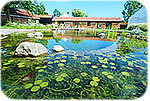
HGTV Gardens says these types of pools usually use three types of plants: floating, deep-water and emergent. Common types of plants used in natural pools include water lilies, reeds, grass and swamp hibiscus; so they're beautiful, too!
Natural Pool Chemicals
Production, transport and storage of chlorine has environmental costs. When you buy less chlorine, or you make your own with a salt system, it reduces the overall demand, and production declines. Think about this: Just one pool owner using a natural water purification alternative can reduce the amount of chlorine in the environment dramatically, according to the website ChasingGreen.org.
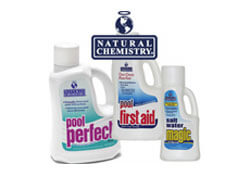
There are many green pool products and chemicals that reduce your chlorine use. Eco-friendly product lines like Natural Chemistry, for instance, clean the pool water and keep it balanced without using chlorine or harmful chemicals.
Pool Covers and Landscaping
Keeping your pool covered when not in use and using strategic landscaping to block wind can reduce the debris blown in from wind and cut down on cleaning needs. These methods can also reduce water evaporation and heating costs. Solar pool covers reduce the need for chemicals, help heat the water and lower evaporation by up to 95 percent, Earth911 reports.
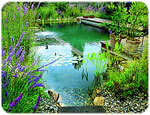
Plants and shrubs help absorb carbon dioxide and some of the other byproducts from traditional pool chemicals. Even if you don’t have a natural pool, you can still plant some purifying plants like reeds and irises near the pool, to help filter the soils around your swimming pool, and purify the air!
So think about adding just one natural purifier or natural clarifier to your pool, or consider switching to a salt chlorinator or go au natural. You can reduce your reliance on chlorine and algaecides, but still have pure and safe pool water.